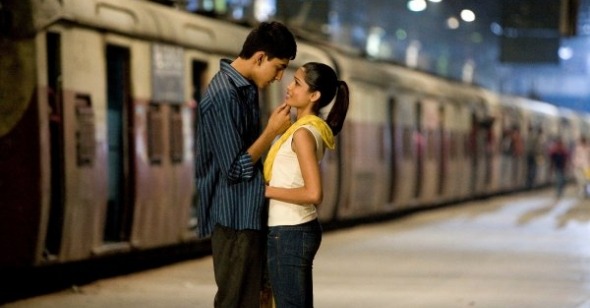Trivial Pursuit
by Eric Hynes
Slumdog Millionaire
Dir. Danny Boyle, U.K., Fox Searchlight
A noisy, sub-Dickens update on the romantic tramp's tale, Slumdog Millionaire zips around a boy's hard-luck life with a strange verve. Ragtag children run through a labyrinthine Indian shantytown with a police officer in hot pursuit. Two boys ride atop a moving train, hanging upside down over the side to steal food from a wealthy family. The same boys arrive at the Taj Mahal and give bogus tours to German tourists. Later they guide an American couple around a scenic village by foot while locals strip their fancy car for parts. The kids are cute, shots are stylishly skewed, cuts are whip-quick, and rousing remixes of M.I.A.'s ubiquitous "Paper Planes" pop-pop and ching-ching throughout. Poverty can be so much fun.
The over-reliance on M.I.A. nods to where Slumdog Millionaire is coming from. British director Danny Boyle and British screenwriter Simon Beaufoy approach their indigenous Indian locales and characters as though components of some pop diaspora, equating wild flower with root. Boyle careens through the hustle and bustle, employing tired "visceral" techniques—jumpy handheld, tilted frames, extreme close-ups—and a LOUD-quiet-LOUD soundscape. But there's a drive to the filmmaking, a harping insistence that something fresh is happening here (or over there) despite the musty narrative. There are surface seductions, such as an emergent cityscape reflected by the tinted shells of designer sunglasses, or a sly, pulse-pounding sequence improbably motivated by the banal mechanics of telemarketing, but the film stalls on style. Like a deep-pocketed club owner or talent manager, Boyle sells Mumbai—or the hip Anglo vision of it—as the new hotness. And pace the title, he's slumming his way to millions.
Structured, in all seriousness, around questions posed on the Indian version of Who Wants to Be a Millionaire? the film thwacks to life when police interrogators rough up eighteen-year-old Jamal (Dev Patel) for allegedly cheating his way to millions on the popular game show. "What the hell can a slumdog possibly know?" they ask rhetorically, alluding to Jamal's orphaned, uneducated past. Jamal wakes from a battered slumber to rejoinder: "The answers. I knew the answers." Roll opening credits as Boyle flashbacks to Jamal and other dirty-soled boys sifting through trash. How DID Jamal know the answers? Not through study, or curiosity or innate brilliance. Our universal hero learned the harder way—from the school of hard knocks, natch.
With the interrogators prodding him to prove his honesty, he flashbacks to colorful and tragic episodes of his life, each birthing a nugget of unconscious trivial knowledge. He knows about guns because he's had them pointed at him; he knows about a Bollywood star because his brother traded away his prized autographed picture; he knows about cricket because—bear with me here—when he finally rediscovered the love of his life in a gangster's lair, that's what said gangster was watching on his flat-screen TV. Another question provokes a flashback to his mom's murder by marauding Hindus (religious and racial conflict is borrowed for plot but never explored), prompting him to tell the police inquisitors, "I wish I didn't know that answer." Oh, for a spotless mind.
A goofy picaresque to rival Forrest Gump, Slumdog Millionaire has a similar power to please, shell-gaming the audience into emotionally investing in and celebrating its protagonist's dumb romanticism. Forrest's behavior was an expression of low IQ, but Jamal's stolen childhood doesn't really explain his simplicity—it's just the only facet he's given. Both Forrest and Jamal pine for the model-pretty playmates of their youths, their first love strong enough to sustain them through life's indignities. Boyle condescends to inserting a shot of Latika (Freida Pinto) whenever Jamal is at his lowest, a guiding light for us all to follow. Also orphaned as a young girl, Latika gets captured by a seemingly beneficent child-slave-herder, pimped out as a virginal belly-dancer, raped by Jamal's teenaged brother Salim (Madhur Mittal), and possessed by the gangster, but Jamal keeps aspiring to save her, undaunted by the plot's tedious insistence on keeping her literally captive. He wants nothing else; he's got nothing else. Knowing that she watches Who Wants to Be a Millionaire? as an escape from her hellish life, he goes on the show to communicate with her. Yes, he phones a friend.
In championing Forrest Gump's purity, Robert Zemeckis's film mocked both U.S. history and the complexities of adulthood, helping to fan the flames of American anti-intellectualism to a towering mid-Nineties blaze. Boyle's ode to dumb love and circumstance hasn't the same deliberation, but Slumdog Millionaire does manage to make bombastic offense. Jamal's success on the TV show makes him a hero to slumdogs everywhere (they gather around televisions in the cities and on the farms with that nostalgic fellow-feeling), but he doesn't care about being rich. He just wants to be with Latika. Quite instructive to the billions of poor people in the world foolishly aspiring to subsistence, let alone wealth. See that heartwarming montage of Jamal through the years, laughing despite the begging, stealing, and enslavement? He's postcolonial, post-material, totally adorable. Love is all Jamal needs. Love and a lobotomy.
